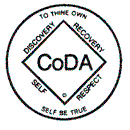
A Twelve Step self-help program for Co-Dependents
Step 1
Step 2
Step 3
Step 4
Step 5
Step 6
Step 7
Step 8
Step 9
Step 10
Step 11
Step 12
This web site has been provided by NY State CoDA
Working the 12 Steps of CoDependents Anonymous (CoDA)
© 2005 NYC CoDA Intergroup. All rights reserved.
The CoDA 12 Steps and 12 Promises are © Co-Dependents Anonymous, Inc.
The Twelve Steps and Twelve Traditions have been reprinted and adapted with permission of Alcoholics Anonymous World Services, Inc. Permission to reprint and adapt this material does not mean that AA has reviewed or approved the content of this publication, nor that AA agrees with the views expressed herein. AA is a program of recovery from alcoholism only – use of the Twelve Steps and Twelve Traditions in connection with programs and activities which are patterned after AA, but which address other problems, does not imply otherwise.
Welcome! This section of our web site is designed to help people work the 12 Steps of CoDependents Anonymous (CoDA).
NOTE:Attending meetings is a vital part of recovery! These readings and exercises are part of the recovery process. We urge you NOT to do this work in isolation. Instead, share your recovery work at a meeting and practice listening to others in an open, non-judgmental way. Then, take what you like and leave the rest. Find what works for you as you work this program in a supportive environment.
Since isolating is a major codependent characteristic, we urge you to venture out into the community of CoDependents Anonymous and share your recovery in a safe, supportive environment.
To find a CoDA meeting, click here: CoDA Meeting locations
Working the Steps
Remember, there is no "right"; way to work the Steps. Find your way. Give yourself permission to work the Steps imperfectly. Continue this process at your pace, in your way, a way that works for you. Meetings are an excellent, safe place to share your Step work. A number of meetings have a Step focus, but any CoDA meeting can work.
Sponsorship
Many CoDA members ask about finding a sponsor. A sponsor is someone in the program who has worked the Steps and can be a resource while you work through your process. You can ask people at your home meeting if they are willing to be your sponsor. There are 2 pieces of CoDA literature on sponsorship available through Intergroup (also available at some meetings). If you have trouble finding a sponsor, don’t be discouraged. Consider finding a safe CoDA friend and forming a “co-sponsor” relationship. Co-sponsors sponsor each other and work the Steps together. Negotiate your boundaries: how often do you want to talk, when is okay to call, etc. Practice listening and empathizing without trying to fix or give advice. Consider using a time limit so that each person shares for an equal time. And remember, you decide what (and who) works for you.
Healthy Communication: In a co-sponsor or other relationship, try the following when listening to someone:
Mirror: when the person finishes speaking, try to mirror back what you've just heard. In other words, summarize what the person has said, to make sure you got it right.
Empathize: next, empathize with anything you can relate to. For example, one may say, "I can really relate to having an unavailable father. I hardly ever saw my father growing up, and it was really painful."
Validate: finally, validate the person. It takes courage to be honest and vulnerable with someone. Honor their process. Let them know that what they've said "makes sense"; and that they've done good work.
If you're tempted to give advice, remember that you are not here to fix other people. Honor the other person’s process and trust that in time they can find the way that works best for them. If you empathize, you can later share what you’ve done in a similar circumstance. If you later feel upset that they won’t follow or even try your suggestion, then remind yourself that you cannot know what is best for anyone else; only they can know that. It is not your job to save them. “We are powerless over others.” Practice listening, mirroring, empathizing, and validating. Detach. Focus on yourself. And be patient with yourself as you learn new behavior.
Suggested Readings
All readings suggested here are from CoDA Conference-approved literature. You may find other literature helpful too, but, in keeping with our Traditions, we refer only to our own literature here. This keeps us from appearing to endorse certain authors, thereby associating with personalities. In CoDA, we are the experts on our recovery. Our literature comes from us and is published by us, in a manner agreed on by us, through the service structure of CoDA. “CoDA Conference-Approved Literature” means that the literature was written by members of CoDA and then reviewed by a group of CoDA members and approved at a national CoDA conference. By us, for us, about us.
To find out how to get CoDA literature, click here.
For each step we have suggested some exercises that you may find helpful. Do as many or as few as you'd like. (Take what you like and leave the rest.) Focus on the process, not the results. Be patient and don't do all of it in one sitting. Take your time. Spread it out. Process the work at meetings, with a therapist and/or with other CoDA members. Best of luck to you on your journey, and congratulations on commiting to your own recovery!
For basic info on CoDA, visit the CoDA World Website at: http://www.coda.org
This web site has been provided by NY State CoDA PO Box 3254 Poughkeepsie NY 12603 - http://www.nyscoda.org - assembly AT nyscoda org